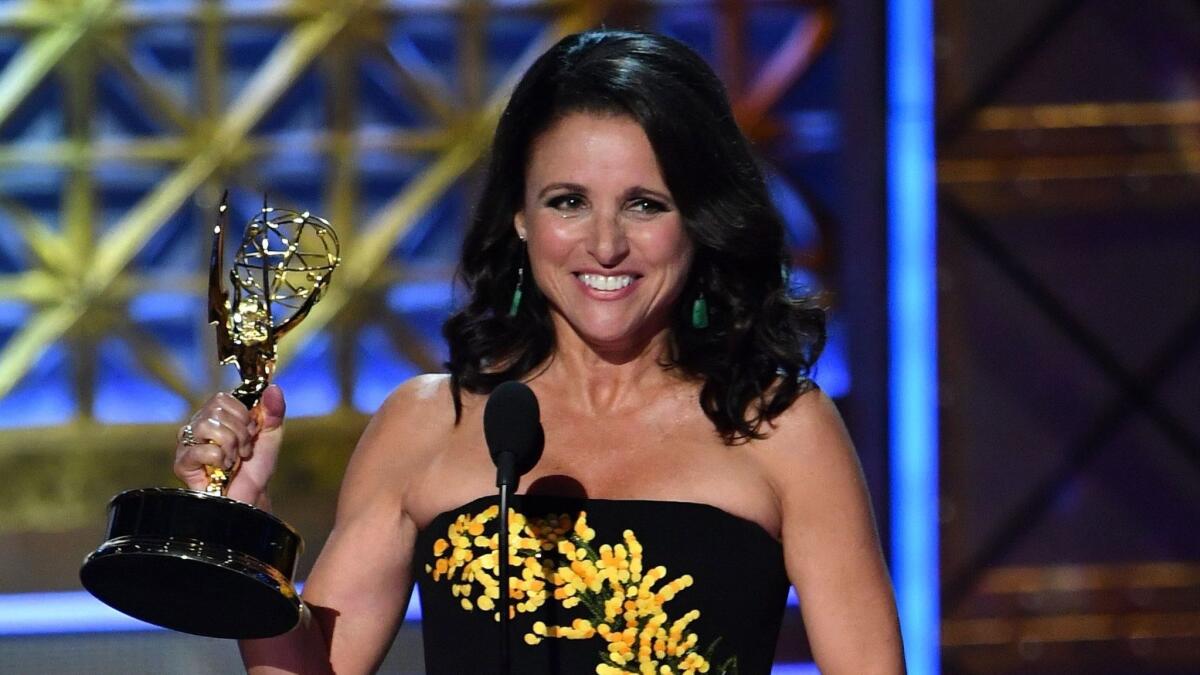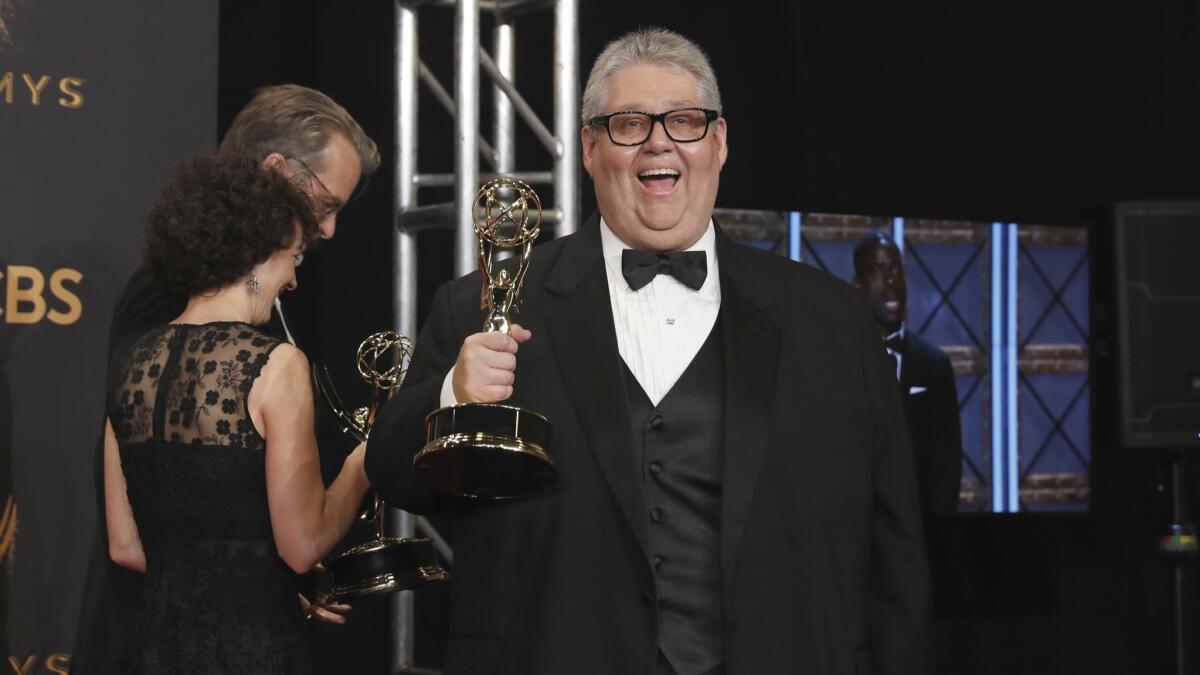‘Veep’ returns for its final season, as cynical as ever, but the real world has caught up to it
- Share via
Reporting from New York — When “Veep” premiered back in 2012, Americans were in the midst of a hard-fought election in which minor gaffes — like Barack Obama’s use of the phrase “you didn’t build that” or an advisor to Mitt Romney who likened the candidate’s policy shifts to an Etch A Sketch — could fuel the news cycle for weeks at a time.
In those simpler times, “Veep” landed like an atomic F-bomb, a profane and deeply cynical comedy about the corrosiveness of American politics. Created by Armando Iannucci, the Scotsman behind the acid satire of “The Thick of It” and “In the Loop,” “Veep” starred Julia Louis-Dreyfus as Selina Meyer, a narcissistic vice president surrounded by foul-mouthed staffers more concerned with scoring wins and crafting artful insults than enacting effective policies.
The show found dark humor in the ironies of the vice presidency — so close to power and yet so far. Without ever identifying Selina’s party, “Veep” skewered the petty brinkmanship of Washington, D.C.
“It tapped into the idea that these are just people in a way that shows about politics had not done before,” says Louis-Dreyfus in a recent interview in New York. “They’re usually aspirational or nefarious. The idea of the mundanity was new, and people were intrigued by that.”
Seven years later, “Veep” heads into its final, belated season on Sunday as one of HBO’s most acclaimed shows, scoring three Emmys for outstanding comedy series. Louis-Dreyfus has cemented her status as a national treasure by winning the Emmy six consecutive times, the most by any performer in the same role, and for her battle with breast cancer, which she has talked about openly.

The series is a must-watch among beltway pundits and has permanently altered the political discourse. “Something out of ‘Veep’ ” has become the shorthand we use to describe farcical displays of incompetence, dysfunction and/or profanity by elected leaders. On Twitter, users impose the show’s closing credits over real-life blunders (e.g. President Trump struggling to connect a phone call with Mexican president Enrique Peña Nieto).
But the world has also changed around it, making the over-the-top antics of Selina and her minions — including Gary (Tony Hale), her freakishly loyal personal aide; Amy (Anna Chlumsky), her tightly wound chief of staff; and Jonah (Tim Simons), an obnoxious White House liaison who later becomes a congressman — seem less outlandish than they once did.
The series went through a major transition after season 4, when Iannucci decided to leave the show and was replaced by showrunner David Mandel, who had worked with Louis-Dreyfus during stints as a writer-producer on “Seinfeld”; he wrote the “Bizarro Jerry” episode, among others.
“We had some labor pains. No doubt about it. That first table read did not go particularly well, says Louis-Dreyfus about the transition. “But to his great credit, he recognized that. We spoke very honestly to one another after the fact. And he … nailed it.”
When Mandel took over in Season 5, Selina had become president after a surprise resignation in the middle of a campaign that ended in an electoral draw. After a protracted recount and arcane tie-breaking process, she lost and returned to the private sector to raise funds for a presidential library. She also fell in love with a Middle Eastern ambassador but dumped both projects at the end of last season to stage one last White House run.
Along the way, viewers have learned more about Selina’s backstory, including her difficult relationship with her controlling mother, her marriage to a chronic philanderer, and her co-dependent relationship with Gary, whom she met in the hospital when giving birth (he was a candy striper who ground up her ice by hand).

The goal has been “figuring out why she needs the validation of the American people,” says Mandel.
As season 7 opens, Selina is back in her stilettos, stumbling across the campaign trail with an awkward new slogan (“New. Selina. Now.”) while trying to avoid the campaign manager she accidentally hired and formally announcing her candidacy the same day as a mass shooting. In other words, it’s business as usual.
Selina is driven by “a brutal ambition that is unrelenting,” says Louis-Dreyfus, dramatically raising her eyebrows, “and rage. Mother … rage. Selina is someone who was not loved or nurtured at all. And so, as a result, she’s a narcissist and is furious. And nothing is ever enough.”
With input from Louis-Dreyfus, Mandel decided Season 7 would be “Veep’s” last during the summer of 2017.
“You hate to sound cliché, like the characters lead you somewhere or the stories take you these places, but they did,” he recalls. After informing the network and cast, he and his staff began writing. By the Emmys in mid-September, four scripts were complete. That night, Louis-Dreyfus won a record sixth Emmy for playing Selina, and the series won for a third time.
“It was wonderful. And she was 99% certain that she had breast cancer, I believe, at that point,” recalls Mandel, who had no inkling she was unwell. “Best actress for a reason.”
When Louis-Dreyfus got her diagnosis the next day, she called Mandel and broke the news. “And then all of a sudden nothing seemed to matter. I mean, I don’t know what else to say. It was just like, ‘Who cares about anything. Is she going to be OK?’ ”
Louis-Dreyfus continued doing table reads through the winter of 2017, scheduling them the day before she went in for chemotherapy so she’d have time to regain strength. Then the production took a long break as Louis-Dreyfus recovered.
“This happened with Julia, and we all came back like, ‘Wow, we really appreciate this show on a whole other level,’ ” says Hale, who sat in on a joint interview with Louis-Dreyfus. (After years spent acting in such physical proximity, they’ve formed a clear bond.)
“The support and the tender kindness that I received from all of my friends at ‘Veep’ during this crazy cancer adventure was a tonic for me,” adds Louis-Dreyfus, “because it was a reminder of the light that was at the end of the incredibly dark tunnel that I was walking through. Coming back to it was a miracle of sorts. I had a newfound appreciation and really, devotion, to this thing called ‘Veep.’ I am freaking over the moon with gratitude for all of these people.”
The production pause also allowed Mandel to consider what “Veep” might look like in a fully Trumpian world — production on season 6 was winding down when he won the election in 2016 — and “rebuild the chassis” of the story to reflect the times we’re living in.
One of the brilliant (if implausible) conceits of “Veep” is that no one ever mentions party affiliation, because ideology takes a back seat to raw ambition; it’s a show both Republicans and Democrats can enjoy amid an increasingly polarized culture war. Selina and Co. operate in an alternate universe that Mandel describes as “Very ‘Back to the Future,’ ” where 9/11 and the Iraq War both happened and BuzzFeed exists, but there are no Clintons, Bushes or Obamas. (Ronald Reagan is the most recent real president to be mentioned in “Veep.”)
Yet for Mandel, a government major at Harvard, it has always been essential that the politics in “Veep” were grounded in reality. In addition to executive producer and former New York Times critic and columnist Frank Rich, the series has received input from figures on both sides of the aisle, including Sen. Mitt Romney, political scientist Norman Ornstein, and former White House counsel John Dean.
And while no one involved directly blames Trump for the end of “Veep,” they do believe his administration has made it harder to dream up the kind of spectacular gaffes, crude insults and vicious backstabbing that make “Veep” such a caustic pleasure.
“If you go back and look at the first few seasons about what counts as something that can torpedo a political career, it was very different,” says Tim Simons, the amiable actor who plays Jonah Ryan, the character who’s inspired many of “Veep’s” most memorable (and unprintable) insults and, in Season 7, is running for president as an “outsider’s insider” who vows to “sweep all the dirt out of Washington.”
“We also pride ourselves on being realistic and being tethered to what could realistically happen. And what can realistically happen has now seismically shifted,” he adds.
More than once, the writers have had to make changes to scripts because of their similarity to real life, scrapping a “golden shower” joke written before the release of the Steele dossier and nixing the red hats made for Jonah’s campaign because they were too MAGA-reminiscent.
“‘It used to be about what are politicians really like behind closed doors,” says Mandel. “There are no closed doors anymore.”
See the most-read stories in Entertainment this hour »
‘Veep’
Where: HBO
When: 10:30 p.m. Sunday
Rating: TV-MA (may be unsuitable for children under 17)
Follow me @MeredithBlake
More to Read
The complete guide to home viewing
Get Screen Gab for everything about the TV shows and streaming movies everyone’s talking about.
You may occasionally receive promotional content from the Los Angeles Times.






